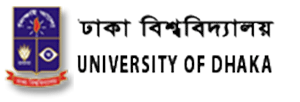Our Presence

Dhaka University (DU) stands at the forefront of research excellence in Bangladesh, with a strong commitment to advancing knowledge and making real-world contributions to the United Nations Sustainable Development Goals (SDGs). According to the data from Elsevier (2024), Dhaka University has made remarkable strides in aligning its research with the global SDG agenda. A total of 14,266 Scopus-indexed documents have been published by 5,935 authors affiliated with DU. This extensive academic output underscores the university’s crucial role in contributing to global knowledge, addressing local challenges, and influencing policy.
Key Insights from the Data Mapping
The distribution of publications across the various SDGs highlights the breadth and depth of Dhaka University’s research efforts. The category-wise breakdown is as follows:
SDG 1 (No Poverty): 291 documents
SDG 2 (Zero Hunger): 370 documents
SDG 3 (Good Health and Well-Being): 2,547 documents
SDG 4 (Quality Education): 176 documents
SDG 5 (Gender Equality): 308 documents
SDG 6 (Clean Water and Sanitation): 799 documents
SDG 7 (Affordable and Clean Energy): 598 documents
SDG 8 (Decent Work and Economic Growth): 530 documents
SDG 9 (Industry, Innovation, and Infrastructure): 530 documents
SDG 10 (Reduced Inequalities): 456 documents
SDG 11 (Sustainable Cities and Communities): 458 documents
SDG 12 (Responsible Consumption and Production): 383 documents
SDG 13 (Climate Action): 372 documents
SDG 14 (Life Below Water): 348 documents
SDG 15 (Life on Land): 265 documents
SDG 16 (Peace, Justice, and Strong Institutions): 364 documents
SDG 17 (Partnerships for the Goals): 3,499 documents
The university’s engagement with SDGs reflects a holistic approach to sustainable development, with notable contributions across health, water, sanitation, climate action, and economic growth. Among these, SDG 3 (Good Health and Well-Being), SDG 7 (Affordable and Clean Energy), SDG 6 (Clean Water and Sanitation), and SDG 17 (Partnerships for the Goals) are particularly prominent, demonstrating the university’s strengths in public health, environmental sustainability, and global partnerships. The research output mapped to the SDGs highlights not only DU’s academic rigor but also its contribution to solving pressing global and local challenges. The large volume of publications on SDG 3 showcases DU’s pivotal role in advancing health and well-being, crucial for addressing health crises and improving the quality of life for communities. Furthermore, research on SDG 6 and SDG 7 reflects DU’s commitment to tackling water scarcity, ensuring access to clean water, and exploring solutions for affordable and renewable energy sources, both critical to Bangladesh’s development and environmental sustainability.
Recognition of Scholars
In recognition of their outstanding contributions, 21 DU scholars were ranked among the top 2% of researchers globally by Elsevier Scopus. This prestigious recognition highlights the university’s growing international influence in research, further cementing its position as a leader in the academic sector not only in Bangladesh but also in the global academic community. The 21 top-ranked scholars represent just a fraction of the talent at DU, underlining the university’s broad academic strength across various disciplines.
Dhaka University’s Role in Research Culture
Dhaka University has consistently demonstrated its leadership in research and academic excellence, especially in fields related to sustainable development. The university has fostered a vibrant research culture, encouraging interdisciplinary collaboration and innovation. This approach has enabled DU to address complex global challenges, integrate local knowledge into solutions, and train the next generation of leaders in research and development.
The publication data from Elsevier further substantiates DU’s reputation as a leading institution in research, particularly in the context of the SDGs. The university’s broad engagement with various SDGs, combined with its top-ranked scholars, positions DU as a key player in both national and international research ecosystems.

